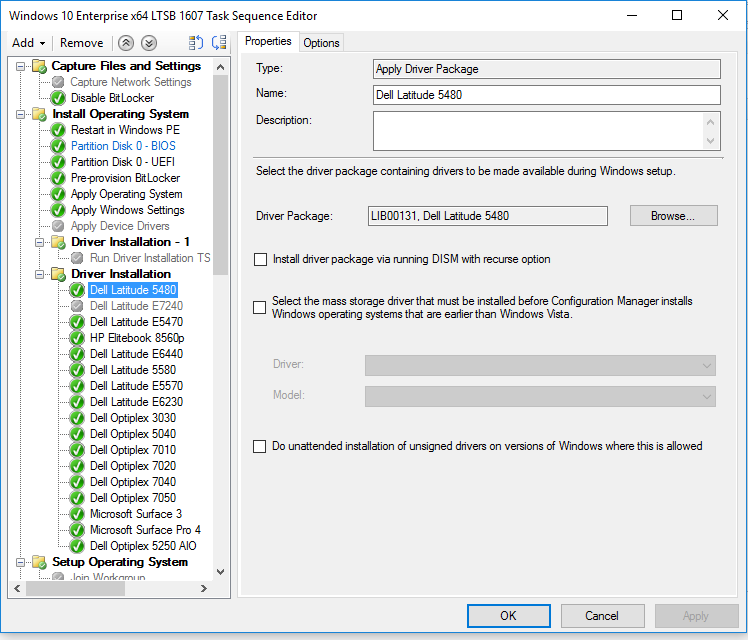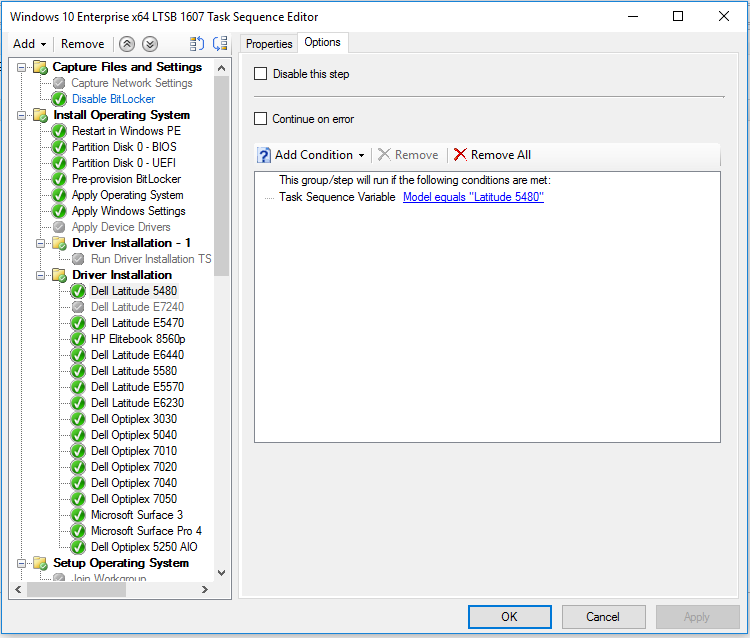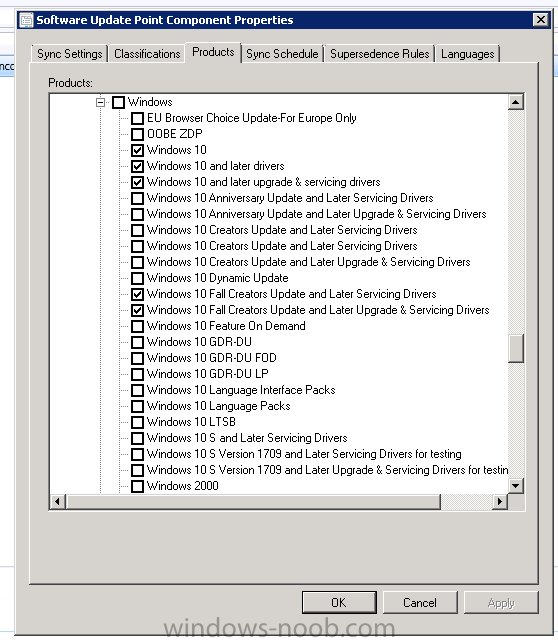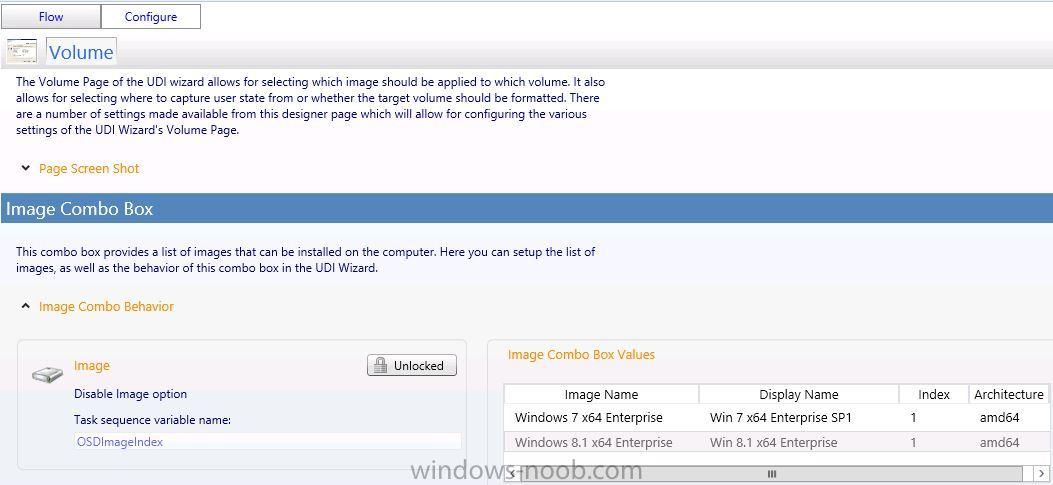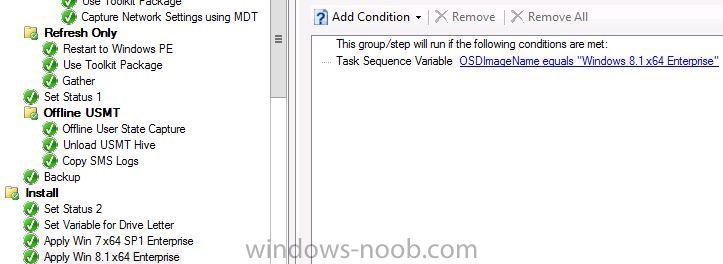Search the Community
Showing results for tags 'drivers'.
-
Hi Looking for advice/recommendations regarding BIOS update ( and settings) and driver servcing for a HP only-shop. I´m aware that there are a number of options available for updating drivers and am trying to find the best solution to fit our needs. We have the luxury of only having one model to service (HP Elitebook 840 G9) thanks to a recent hardware swap which was done in conjunction with rolling out W11 to all our users. We are running CM 2303 and using HP driver packs for TS/OSD bare metal deploys. What we would like to achieve is the following: Update BIOS if/when needed. Check compliance of BIOS settings (password, boot order, secure boot etc.) Create a baseline of updated preapproved drivers to deploy HP have their options with MIK/Image Assistant/CMSL which I don't have any experience of but seem interesting. I am, however, a little bit hesitant when I read some comments from experienced config manager admins that have had difficulties when evaluating these options in the past (to be fair, a few years ago, things may have improved since). We have used third-party catalogs in CM in the past when we had a mix of Lenovo and HP and my experience was not very good (I won't go into the details but it was mostly Lenovo-related). Considering that we only have one model to keep updated, what do you think based on your experience would be a reasonable solution (time and effort) to look at? I like to keep things simple with as little interaction as possible for the user. Any real world advice would be appreciated, regardless if it´s a vendor specific, community tool or commercial product. Thanks in advance! Emile
-
Parsing step node: Dell Latitude 5480 TSManager 4/30/2018 8:33:29 AM 3632 (0x0E30) Description: TSManager 4/30/2018 8:33:29 AM 3632 (0x0E30) ContinueOnError: TSManager 4/30/2018 8:33:29 AM 3632 (0x0E30) SuccessCodeList: 0 TSManager 4/30/2018 8:33:29 AM 3632 (0x0E30) RetryCount: 0 TSManager 4/30/2018 8:33:29 AM 3632 (0x0E30) A condition is associated with the step found TSManager 4/30/2018 8:33:29 AM 3632 (0x0E30) Found and operator. TSManager 4/30/2018 8:33:29 AM 3632 (0x0E30) There are 1 operands TSManager 4/30/2018 8:33:29 AM 3632 (0x0E30) **Processing expression node TSManager 4/30/2018 8:33:29 AM 3632 (0x0E30) Found SMS_TaskSequence_VariableConditionExpression expression. TSManager 4/30/2018 8:33:29 AM 3632 (0x0E30) **In ProcessBuiltInCondition node: expression TSManager 4/30/2018 8:33:29 AM 3632 (0x0E30) There are 3 operands in the built in action TSManager 4/30/2018 8:33:29 AM 3632 (0x0E30) Operand Operator=equals TSManager 4/30/2018 8:33:29 AM 3632 (0x0E30) Operand Value=Latitude 5480 TSManager 4/30/2018 8:33:29 AM 3632 (0x0E30) Operand Variable=Model TSManager 4/30/2018 8:33:29 AM 3632 (0x0E30) Successfully added 3 condition parameters TSManager 4/30/2018 8:33:29 AM 3632 (0x0E30) Disable: TSManager 4/30/2018 8:33:29 AM 3632 (0x0E30) Run in attribute: WinPE TSManager 4/30/2018 8:33:29 AM 3632 (0x0E30) Timeout: TSManager 4/30/2018 8:33:29 AM 3632 (0x0E30) DefaultVarlist found TSManager 4/30/2018 8:33:29 AM 3632 (0x0E30) Variable name: OSDRecurse TSManager 4/30/2018 8:33:29 AM 3632 (0x0E30) Variable name: OSDAllowUnsignedDriver TSManager 4/30/2018 8:33:29 AM 3632 (0x0E30) Action command line: osddriverclient.exe /install:LIB00131 /unsigned:%OSDAllowUnsignedDriver% /recurse:%OSDRecurse% TSManager 4/30/2018 8:33:29 AM 3632 (0x0E30) Above is an excerpt from smsts.log for that driver package and part of the TS. My TS for the driver install To verify the "Model" on the computer itself I am running the following command And the result, is that none of the drivers install during any of the driver package installs. - This may be a dumb question, but should I be using the variable "Name" rather than "Model"? Thanks!
-
Cross Post from https://www.ccrossan.com/sccm/sccm-1511-driver-migration-fails/ While migrating drivers from SCCM 2012 to SCCM 1511, the migration can fail with the following error message: Couldn't find the specified instance SMS_CategoryInstance.CategoryInstance_UniqueID='DriverCategories: This occurs given the following scenario: A driver is added to SCCM A category is assigned to the driver The category is deleted from the driver The migration job attempts to migrate the driver to a new SCCM environment Consider the following error message: Couldn't find the specified instance SMS_CategoryInstance.CategoryInstance_UniqueID='DriverCategories:78266da1-ebac-4c12-b2c8-89451383b03e An In-depth analysis shows that the driver category does not appear in the WMI Class SMS_CategoryInstance: Get-WmiObject -Namespace $Namespace -Class SMS_CategoryInstance -Filter "CategoryInstance_UniqueID = 'DriverCategories:78266da1-ebac-4c12-b2c8-89451383b03e'" Returns Null, but a SQL query indicates that the Category Instance still exists: SELECT * FROM CI_CategoryInstances WHERE CategoryInstance_UniqueID LIKE ‘%78266da1-ebac-4c12-b2c8-89451383b03e%’ Returns the following: CategoryInstanceID CategoryInstance_UniqueID CategoryTypeName DateLastModified SourceSite ParentCategoryInstanceID IsDeleted rowversion 16777602 DriverCategories:78266da1-ebac-4c12-b2c8-89451383b03e DriverCategories 2015-07-27 11:52:33.000 CM1 NULL 1 0x000000000A36B34D Take note of the “IsDeleted” column – set to True So, at this point, WMI reports that this category no longer exists; however the category is still in the SQL Database, though this is not the root of the problem. Now consider the WMI Class SMS_CategoryInstanceMembership: This class contains a correlation of Objects to CategoryIDs. This is not limited to Driver <-> Driver Category correlation. The true bug seems to be that when a driver category is removed, the entry for that driver category in the SMS_CategoryInstanceMembership class is not removed. In order to fix this, and have a successful migration, we need to manually remove the CategoryInstanceMembership object for any drivers that were assigned a now deleted category. to Fix: Fire Up SQL Server Management Studio Create a New Query, and select your Site Database For each failing driver entry (as seen in “C:\Program Files\Microsoft Configuration Manager\Logs\migmctrl.log”), Run the following SQL Query: SELECT * FROM CI_CategoryInstances WHERE CategoryInstance_UniqueID LIKE '%c6e9d9e3-1371-46ba-b7f1-bb46c5b6bc06%' Note the CategoryInstanceID (should be like 16777601) On your SCCM Server, from an administrative PowerShell run the following code to remove the association, substituting the CategoryInstanceID you discovered in step 3-2: Get-WmiObject -Namespace $Namespace -Class SMS_CategoryInstanceMembership -Filter "CategoryInstanceID = '16777601'" | Foreach-Object { Remove-WmiObject -InputObject $_ } Repeat the above section for each unique CategoryInstance_UniqueID listed in the “C:\Program Files\Microsoft Configuration Manager\Logs\migmctrl.log” file. When complete, retry the migration, and examine for any additional missing CategoryInstance_UniqueID errors.
-
As someone who is installing his first SCCM solution, I hope this is something easy. I believe that SCCM is deleting kodak scanner drivers from our Windows 10 LTSB 2016 clients, however I don't believe I have any drivers set to update within SCCM. I currently have our Windows 10 ADR set to run on the 2nd Friday of each month and SCEP / Defender updates running each morning @ 1:00am. (Users report seeing the Config Manager Taskbar notification on occasion throughout the month though) When looking at the Driver events all clients seem to lose their Kodak i2xxx scanner driver between 10:30am and 10:50am Finally, when I disabled my ADR's for a few days the drivers were not deleted during that time. Current Site settings: Current Windows 10 Automatic Deployment Rule Settings:
- 2 replies
-
- adr
- windows 10
-
(and 1 more)
Tagged with:
-
Is it safe to import drivers for a newly acquired model while an osd task sequence might be running? I say might be running because our company is a global one and imaging of machines can be going on without my knowledge. Should I wait for our change management window to import new drivers for use in the OSD or is it safe to do so during business hours?
-
Hi, We are currently looking at deploying windows 10 education 1610 across our corporate network (we are a college). The gold image has been created and successfully deployed to machines however we are finding that there are some drivers missing from the machines on completion. I know that drivers can be added into SCCM as packages to be used in the deployments but since we dont run on a standard model of machine this can become a bit of a laborious process. We noted that when you install a standard version of windows in a non corporate environment, windows will try to find drivers for unknown devices via windows update. Obviously updates within the network are controlled by SCCM but what we want to be in a situation where a machine is imaged and then windows update searches for any missing drivers. We have updated the configuration of the updates within SCCM to include updates for windows 10 and servicing to hopefully enable this (see the below images). I think really we need to know if what we want to do is actually possible within the scope of SCCM or if we are going to have to stick to the classic method of creating and importing numerous driver packages each time we add new hardware to our network. Any advice from the experts would be most useful! Thanks, Simon
- 3 replies
-
- sccm
- windows 10
-
(and 2 more)
Tagged with:
-
We are running a single SCCM 2012 R2 SP1 CU1 server in out LAB environment with the following patches applied: https://support.microsoft.com/en-us/kb3091103/ https://support.microsoft.com/en-us/kb/3089193 https://support.microsoft.com/en-us/kb/3084586 We are LAB testing the Windows 10 deployment to our devices, including Surface Pro 3, Dell E5550, Dell E5530. Boot image is version WinPE 10.0.10240.16384 At this moment we are having issues with installing device drivers during deployment. Some drivers get installed without problems, but most of them won't install at all. Following is logged in smsts.log for every device that has a missing device driver: All drivers got installed successful in SCCM without errors, categorized and packages are created + deployed. Manually installing the drivers afterward using the same source files works without a problem and all drivers get installed perfectly so the drivers are correct. We have played around with setting "Best mached drivers" and "Limiting driver categories" for Auto Apply Drivers but to no result. The TS includes SMSTSDownloadRetryCount and SMSTSDownloadRetryDelay, without this the TS would error out. For testing we also tried Windows 7 deployment + drivers on the same server and that worked without problems and all drivers get installed. Anyone have any idea about this?
-
team, I have Offices spread about the world with DPs at each of them. I'm cooking with Config Man CB 1702, Single site. 14 internal DPs and 1 internet facing DP. Shiny. Albeit Drivers, Packages or Applications; not every site (office) requires all content I have to offer. I have a single OSD TS I'd like to use, but I cannot afford distributing every package to every DP around the globe. e.g. a site sporting only laptops does not need to have all desktop drivers on their DP. The problem and question is: How do I keep the TS from failing it's dependency check when a laptop only site UEFI PXE boots to run this single OSD TS and cannot find a package on it's DP; for this example the Desktop driver Packages? In advance, thank you kindly
-
- single task sequence
- osd
- (and 7 more)
-
Strange issue I cannot find any posts about. I deleted some obsolete driver packages, then the drivers, and then the data files and they still appear in the Task Sequence deployment. Tried a few different script out there to delete driver packages and the did not see them either. Restarts and no success in removing them from the TS Deployment. Server: Windows 2012 R2 SCCM CB 1702, WADK 10.1.15063, MDT 6.3.8443.1000, and SQL 2014 in 2012 mode Thank you.
- 3 replies
-
- sccm
- task sequence
-
(and 2 more)
Tagged with:
-
Hey guys Got a new machine, to image. Imported all the drivers as usual, and the network driver was already in the boot image from an earlier model that uses the exacy same network driver. ( already double checked this to ) Turned off secure boot in the Bios, and attempted to pxe boot into the Task Sequence window. The machine reboots right before it manages to bring up the task sequence window. Looking at the smsts.log it display the error in the subject of this post Did a F8 before it rebooted the second time round and issuing an ipconfig shows no IP address. It just displays Windows Ip Configuration. The network drivers are in the boot image so not sure what else to do here? The machine is a Lenovo M910z (10NU)
-
Good Afternoon everyone, Currently my shop uses 95% Dell computers and there are varying models however I have noticed a large overlap of drivers while utilizing the Dell Driver CAB's between different models. Right now, I have 11 different driver packages that total 15.6 GB, and my source location for the drivers (another drive on the same server) totals 15.6 GB as well. What I would like to do is delete all the duplicate drivers, yet make sure that all of my packages are able to still use the drivers. Is there a simple way to do this? Thanks
-
Hello, My question is regarding applying driver packages during OSD and issues after the image is laid down. I recently updated my Dell Latitude E6420 Windows 7 x86 driver package with the latest cab file from Dells website. After creating the new driver package and applying it to the OSD task sequence, I have had reports that some E6420's are having problems getting stuck on the Windows Start Splash Screen. After several reboots the users state that it is intermittent but that it continues to hang on the windows start screen. However, I also have an E6420 and I cannot recreate the problem. Which logs should I be looking at on the problem computers? Could this have to do with BIOS settings for SATA operation being on either AHCI or RAID on? Video Driver possibly? Any help would be much appreciated. Cheers, Joe
-
Good afternoon, I have a windows 10 task sequence that lays down the OS nicely, installs all drivers, and activates windows/etc. We have kept fairly strict on standardizing the models of laptops/desktops that we purchase for our school district. We have a group of Lenovo T420 laptops that images perfectly with Windows 7 x86, but we just received a new batch and we're going to push Win10 x64 Professional to them. When getting the first one imaged, I noticed there were 4 or 5 drivers the task sequence did not take care of. I manually downloaded them, some of them only listed compatible with Windows 7 x64, but they worked fine with Win 10 x64, no issues whatsoever. I added those drivers to my sccm server, added them to my "x64 Lenovo Laptops" Driver Package, and updated them on my distribution point. I noticed when I right click the driver and go to the "Applicability" tab, it only had Windows 7 (64-bit) checked. I made sure Windows 10 Professional/Enterprise and higher (64-bit) was selected and even did 32-bit as well, applied, updated my distribution points, and I reran my OSD task sequence. Two drivers remain uninstalled after running the task sequence. 1) Base System Device, which is Ricoh PCIe SDXC/MMC Host Controller and 2) Intel® Active Management Technology - SOL I've double checked, readded the drivers to the packages/server, updated my distribution points and it does the same thing, only those two drivers WILL not install. What am I missing? Any help is appreciated, thank you!
-
Hello, I am trying to image an HP EliteDesk 705 G2 using MDT 2013 ver 6.3.8330.1000. I am using a task sequence that defines what drivers are downloaded based on make and model. Installing Windows 7. It works for every model we image with the exception of the 705 G2. It does not download the drivers as I can see it does with all the other models. Has anyone else had this problem with this model? smsts.log
-
Hi all, I have my own lab in running on my Macbook Pro (mid 2015). I'm using vmware Fusion 8 pro and almost everything works fine. When I try to run a task sequence to build and capture it fails when the step is "capture" because the network driver is not loaded. Actually I added two network drivers to my boot image: from vmware and intel 82574L (which is the one that is not loading). Nevertheless, the computer restart and start loading the boot image to capture the windows, but fails immediately and I'm out of options. Does any one had this issue before? The driver is not digitally signed but was correctly injected to the boot image. note: the driver is correctly loaded when I'm booting from the network (pxe) and I can't copy the log because I don't have any driver loaded... no network nor copy paste basic functions... Any help will be much appreciated!!! Thanks in advanced!
-
Hello, I'm building a Windows 10 image, so far everything is ok except that my TS won't push the Drivers to my Surface Pro 4. I don't have any error message ,It detects it as a tablet, and the task finishes successfully, but no drivers are installed. See below : The task sequence execution engine started the group (Apply Tablet Drivers). The task sequence execution engine successfully completed the action (Apply Driver Package) in the group (Apply Tablet Drivers) with exit code 0 Action output: ... 6.0 The operation completed successfully. Process completed with exit code 0 Dism successfully added drivers to the offline driver store. Successfully added "C:\_SMSTaskSequence\Packages\SE1000EF\77486B10-EC84-479D-BC68-8A9B73B08884" to the Windows driver store. Adding "C:\_SMSTaskSequence\Packages\SE1000EF\8D062E93-EBDF-426F-A326-F7B02AEF32CA" to Windows driver store. Setting %SystemRoot% to "C:\WINDOWS" GImage Version: 10.0.10586.0 The operation completed successfully. Process completedwith exit code 0 Dism successfully added drivers to the offline driver store. Successfully added "C:\_SMSTaskSequence\Packages\SE1000EF\8D062E93-EBDF-426F-A326-F7B02AEF32CA" to the Windows driver store. Successfully applied driver package "SE1000EF".ReleaseSource() for C:\_SMSTaskSequence\Packages\SE1000EF. reference count 1 for the source C:\_SMSTaskSequence\Packages\SE1000EF before releasing Released the resolved source C:\_SMSTaskSequence\Packages\SE1000EF Exiting with return code 0x00000000. The task sequence execution engine successfully completed the group (Apply Tablet Drivers). Any idea what could be the reason ?
- 1 reply
-
- surface pro 4
- windows 10
-
(and 1 more)
Tagged with:
-
I have an interesting one. I created a driver pack for a dell e5450 copied my production TS and added the drivers to it. Let it run drivers installed fine. So I added the step to my production TS and the drivers don't install the logs say it can't find the content. Any ideas because I am scratching my head.d
-
Hi I'm having some problems installing drivers for Windows 10 when using OSD. If I run my Task Sequence with no drivers all is good. Windows installs and programs too. If I try and include a driver package then the deployment fails. I've look at this thread http://deploymentresearch.com/Research/Post/443/Beyond-unsupported-Deploying-Windows-10-preview-including-drivers-with-ConfigMgr-2012-R2 but my MDT folder does not have the DISM folder. Also, I'm not sure what boot image I should be trying to get the files from? Can I take them from a Windows 10 install? Sorry for the noob type questions! Thanks Richard
- 2 replies
-
- Windows 10
- SCCM 2012
-
(and 1 more)
Tagged with:
-
We are running SCCM 2012 R2 with 1 CAS and 3 DP's. Starting approximately 3 weeks ago I started getting reports of computers failing OSD during driver provisioning with error code 0x80072ee2 (operation timed out). I cannot think of anything that changed during that time. The problems happens with any TS and only at the driver provision step. We are using auto driver provisioning and use categories to keep them organized. Here is what I have come up with so far: - I am able to ping the DP's during the TS failure. - The clients are able to see the DNS and DHCP servers. - I turned off antivirus and the firewall on the distribution point temporarily but this had no effect. - This is happening on several different models all of which have the proper drivers imported. - If I use driver packages then the TS finishes successfully. - All of our SCCM servers are virtual so I tried migrating DP2 to a different host but this had no change on the behavior. - I changed the Network Access account but saw no improvement. - I added the 2 variables SMSTSDownloadRetryCount and SMSTSDownloadRetryDelay as a work around so that the client will keep trying to get the drivers and this has helped but the underlying issue is still there. - Comparing the client SMSTS log and the MP_DriverMgr.log shows that the client sends a driver request and it is received by the DP. The DP executes a driver match but doesn't send a response back to the client for ~8 minutes. By that time the client has already failed the driver step with the Timed Out error. I have attached logs from the client and the DP. - This is only happening at Distribution Point 2. As a test, I changed our main boundary group to assign clients to Distribution Point 1 and imaged a couple computers. The computers looked to DP1 for drivers and DP executes the driver request and sends the response in under 2 minutes. I know that this confusing fast so if you have any questions just ask and I'll get more specific where needed. I have edited the hostnames out of the logs. SMSTSExample.log DP_DriverMGR.log
- 1 reply
-
- osd
- auto apply driver
-
(and 2 more)
Tagged with:
-
Hi, guys! I have problems with driver installation during OSD. I use "auto apply drivers" method. Earlier all works fine. But now this doesn't work. Report says that drivers was found, however nothings installs Which log contains driver installation information? smsts says only: Adding instruction at 113 TSManager 29.06.2015 13:11:20 1920 (0x0780) Parsing step node: Auto Apply Drivers TSManager 29.06.2015 13:11:20 1920 (0x0780) Description: TSManager 29.06.2015 13:11:20 1920 (0x0780) ContinueOnError: TSManager 29.06.2015 13:11:20 1920 (0x0780) SuccessCodeList: 0 TSManager 29.06.2015 13:11:20 1920 (0x0780) No condition is associated with the step. TSManager 29.06.2015 13:11:20 1920 (0x0780) Disable: true TSManager 29.06.2015 13:11:20 1920 (0x0780) Run in attribute: WinPE TSManager 29.06.2015 13:11:20 1920 (0x0780) Timeout: TSManager 29.06.2015 13:11:20 1920 (0x0780) DefaultVarlist found TSManager 29.06.2015 13:11:20 1920 (0x0780) Variable name: OSDAutoApplyDriverBestMatch TSManager 29.06.2015 13:11:20 1920 (0x0780) Variable name: OSDAllowUnsignedDriver TSManager 29.06.2015 13:11:20 1920 (0x0780) Action command line: osddriverclient.exe /auto /bestmatch:%OSDAutoApplyDriverBestMatch% /unsigned:%OSDAllowUnsignedDriver% TSManager 29.06.2015 13:11:20 1920 (0x0780) And nothing more.
-
Hi, if you are using UDI wizard to deploy your OS and If you want to have drivers installed for same laptop/machine but different OS you need to add a condition for both packages: 1. First you configure the operating systems in UDI wizard, then their name (Image Name, NOT display Name!) is what counts. 2. Then you implement OS into UDI task sequence, and for that to work you also use OSDImageName variable. For example Windows 7 x64 Enterprise you Add condition->TS variable->OSDImageName equals "Windows 7 x64 Enterprise", I got that name from UDI wizard. For Windows 8 x64 the same, just make another step including Install Operating system Windows 8 and change the variable according to the name. 3. Then create install driver steps both for different OS and also add the condition like bellow: You have to specify both conditions in order to work, otherwise it will install both driver packages. Thanks,
-
Hey all! I'm calling out for anyone who's had issues installing drivers on an Optiplex 7010 through SCCM. I have taken the task of getting SCCM to work within our local hospital and I've managed to get the Optiplex 780 and 790 to deploy correctly with no issue whatsoever. However, when I follow the exact process for the Optiplex 7010 the task sequence will fail once it is required to gain access to our software source and install all of the applications specified in the TS. On further inspection within the logs it's clear to see that the Ethernet driver has not installed at all which results in failure of deploying Windows 7. I have read that SCCM doesn't work well with Intel 825xx series network card although I can't prove the validity of this. I also read that NIC devices which require a special driver for WinPE may cause the TS to fail if the OS is Vista or newer. I'm not entirely sure where to go on from here currently. I don't want to have to capture the image of a 7010 physically so for now I'm ruling that option out unless there are now alternatives.
-
Hi All, I'm having an issue with OSD on the XPS 13 9333. I can PXE boot the device and install the OS I also applied all the drivers from the driver CAB on the DELL website (http://en.community.dell.com/techcenter/enterprise-client/w/wiki/2065). The problem I have is after the task sequence installs the OS and drivers it reboot to windows 7, once it reboots the USB ethernet is no longer installed so the task sequence fails. I'm using a Dell fm76n usb ethernet device for the network and I've create a driver package to install the driver that came with the device however it still will not build please help
-
Hello All, I have tried searching but have not found anything that covers my specific need/concerns. I am trying to deploy a clean install of Windows 7. That part completes successfully however Windows 7 does not have the drivers for the network adapter built in. As soon as windows deploys, communication with SCCM and the rest of the world halts. What can I add to the task sequence to make sure that the driver is downloaded to the machine before/during the windows install? My Build: SCCM 2012 Sp1 CU3 Windows Server 2008 R2
-

OSD: Driver unavailable on via driver update
pbalderos posted a question in Deploying Operating Systems
Good day! I have a small problem but I am sure its just because I am still learning about OSD and Task Sequence. Here is the issue: I have an HP NC6400 orginally built for XP but have worked on Windows 7 (Well until it became time to re-image) I have been able to find most of the missing drivers and test that they worked and cleared any errors out of device manager. The only one I cant seem to find it ATI-Mobility Radeon X1300, how ever I was able to install it just by right clicking and updating the driver then rebooting. Since my goal is to automate as much of the OSD process as possible I would like to have this step performed in task sequnce (if possible). Is it possible to script this process or are any other options? Thanks in advance, Phil


